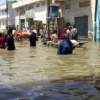An explosion targeted a passenger bus in a region outside the Somali capital on Wednesday, resulting in the tragic loss of at least six lives. The state news agency reported this distressing incident, shedding light on the harrowing consequences of the attack.
According to reports from the Somali News Agency, the governor of the Lower Shabelle region, Mohamed Ibrahim, confirmed the event. The attack unfolded on a roadway connecting the Qoryoley and Marka districts, and it left an additional dozen individuals injured. Tragically, this act of violence marred the lives of innocent passengers on their journey.
Governor Ibrahim pointed to the detonation as a result of a terrorist attack. The specifics of the incident were relayed through the state news agency’s social media account on X, formerly known as Twitter. However, no immediate attribution was provided as to the group behind this reprehensible act.
The omission of the responsible party raises questions regarding the identity of the perpetrators. While no official claim has been made, the notorious al-Shabaab, an al Qaeda-linked extremist organization, has historically taken credit for comparable assaults. With a history dating back to 2006, al-Shabaab has relentlessly pursued the goal of unseating Somalia’s central government. Their overarching aim has been to establish their governance based on a rigid interpretation of Islamic Sharia law.
The incident serves as a stark reminder of the persistent insecurity and instability that afflicts certain regions within Somalia. Acts of terrorism not only disrupt daily life but also inflict deep wounds on the social fabric of communities, leaving innocent civilians grappling with grief, injury, and fear.
The attack underscores the pressing need for enhanced security measures and collaborative efforts to thwart the activities of such extremist groups. As Somalia strives for stability and progress, countering the threat posed by these entities remains a paramount concern. Swift and coordinated responses are essential to curbing the violence that has, for far too long, marred the nation’s potential for peace and prosperity.
In this moment of sorrow, the resilience of the Somali people is once again tested. As investigations unfold and authorities work to bring the perpetrators to justice, the collective strength of the nation must not waver. A unified stance against terrorism, coupled with efforts to rebuild and fortify the nation’s security apparatus, is vital to securing a safer future for Somalia and its citizens.











